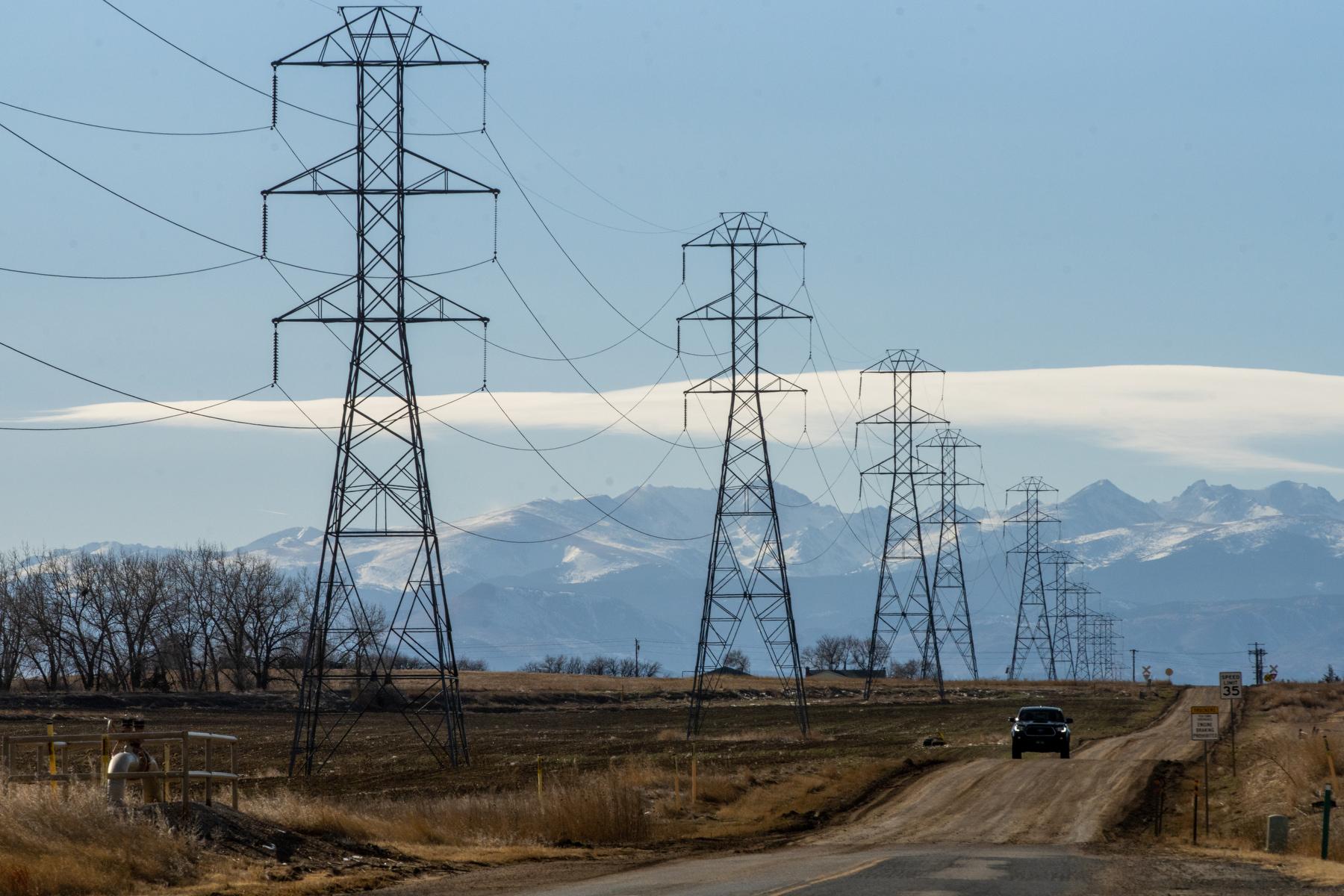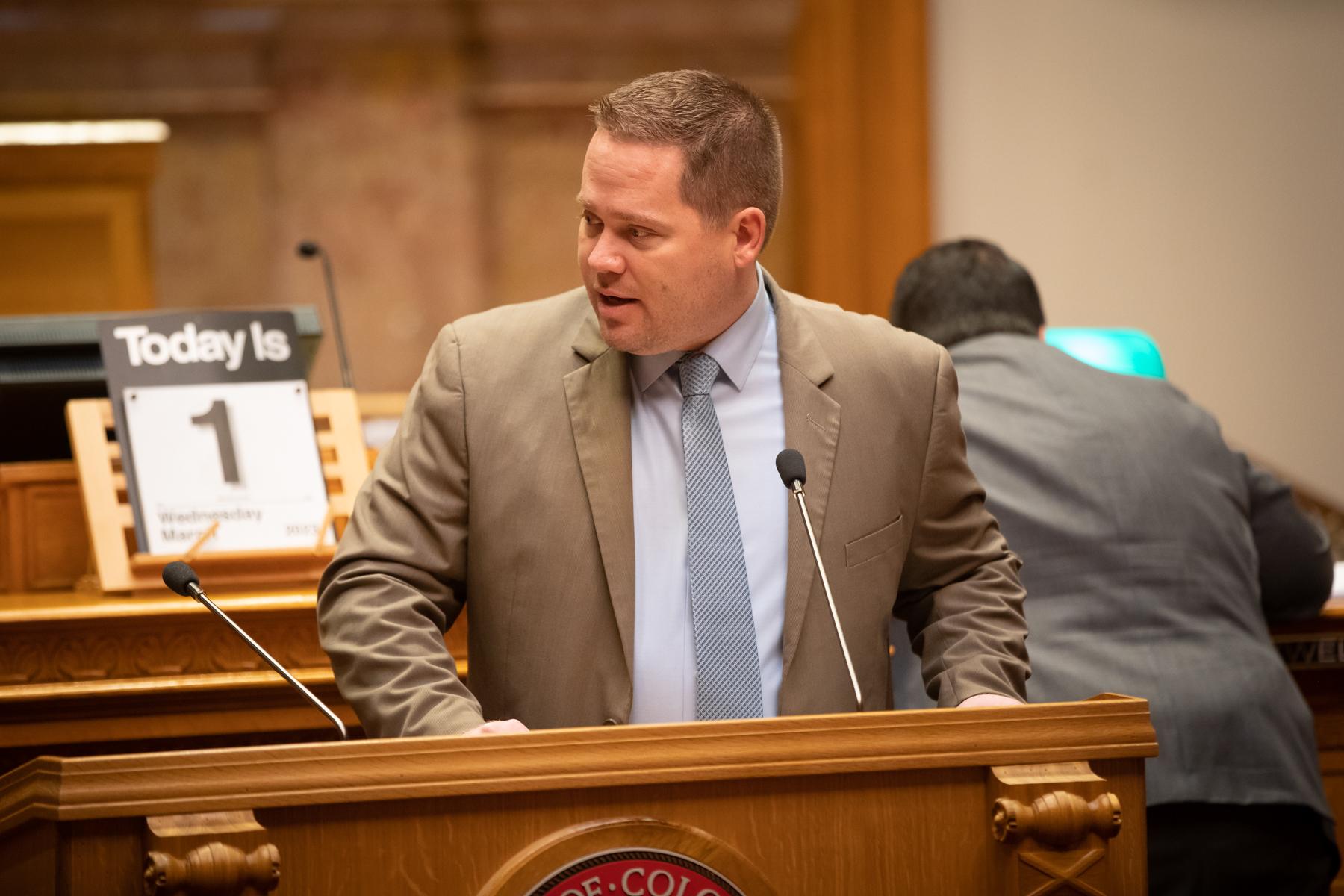
Xcel Energy is working to restore power to thousands of customers across the Front Range, but the company’s president says preemptively powering down parts of the electricity grid likely prevented sparks and arcing during a weekend windstorm that could have ignited a wildfire.
About 16,000 customers were without power early Monday evening, according to data from Xcel Energy.
Some of the power outages stemmed from damage to lines and poles, but some customers are still without electricity due to Xcel Energy’s decision on Saturday to preemptively shut off power for 55,000 customers to reduce the chances that wind-damaged power equipment might ignite a wildfire.
This is the first time any utility has preemptively de-energized power lines due to wildfire conditions in Colorado, but Robert Kenney, president of Xcel Energy’s Colorado Operating Company, said preliminary assessments show damage to lines, poles and other equipment that could have sparked a wildfire.
“We've seen trees in our lines, we've seen downed power lines and we know that had those lines been energized, it very likely would've caused an ignition,” Kenney told CPR News in an interview.
The National Weather Service issued warnings and alerts for potentially dangerous wildfire conditions across much of the region and the heavily populated Interstate 25 corridor over the weekend.
On Friday, Xcel Energy announced it was considering powering down portions of the grid. On Saturday, Kenney said utility officials factored in the latest weather conditions, data from software that models wildfire risk, consulted with company meteorologists — and announced plans to carry out the emergency power shutdown.
Many customers were caught off guard. Kenney said Xcel Energy notified affected customers by phone and email on Friday and Saturday, but some customers interviewed by CPR News said they never received calls or notifications — or said they received information that wasn’t accurate.
Hosea Rosenberg, owner of Blackbelly, a popular restaurant and butcher in Boulder, said neither he nor the staff was notified before the power was cut Saturday afternoon.
“The frustrating part for me was the lack of communication from Xcel, especially since they planned this outage,” Rosenberg told CPR News. “They knew they were doing it, and they failed to alert vulnerable, small businesses that were severely impacted by this. Now we're just trying to put it all back together.”
Blackbelly staff scrambled to find refrigerated trucks and dry ice to salvage food stored at the restaurant, but Rosenberg said the business was already hurt by having to call and cancel hundreds of reservations over the weekend.
Xcel President Robert Kenney acknowledged problems communicating the shutdown to customers and said the utility would work to give customers more warning the next time it turns off electricity preemptively.
“That's probably one of the single biggest pieces of feedback that we've gotten is that customers would've preferred longer lead time notification,” he said. “We hear that feedback loud and clear.”
Smaller utilities across the state also worked Monday to restore power that was knocked out by high winds, including United Power and CORE Electric Cooperative, which was inspecting downed lines to ensure they were safe before re-energizing.
The preemptive power shutdown cut off electricity to a wastewater treatment center in Boulder, where workers raced to keep raw sewage from overflowing into Boulder Creek.
Sarah Huntley, the director of communication and engagement for the City of Boulder, said “very quick-thinking” workers at the plant managed to divert the sewage into a storage tank before it spilled into the creek, which also serves as the primary water source for Lafayette and Erie.
In Jefferson County, authorities formed an impromptu task force after getting calls from residents on oxygen who couldn’t use outlet-powered concentrators and didn’t have a large enough supply of tanks to last through the weekend.
“They were able to help those residents — getting them some additional oxygen and those residents also have their power up and running right now,” said Jefferson County Commissioner Lesley Dahlkemper.
Preemptive power shutdowns are a relatively new tool for electric utilities operating in regions where climate and weather conditions increasingly mean more wildfires, said Daniel Swain, a UCLA climate scientist who works at the National Center for Atmospheric Research in Boulder.
California utilities were likely the first to adopt preemptive power shutdowns, Swain said, pointing to several high-profile wildfires linked to utilities in that state, including the 2021 Dixie Fire, which started after a tree fell onto power equipment owned by PG&E, which had filed for bankruptcy protection after it was found responsible for billions of dollars in liability from several wildfires, including the 2018 Camp Fire that killed 85 people.
Investigators have linked Xcel Energy’s power lines to one of two fires that fueled the 2021 Marshall Fire, the most destructive ever recorded in Colorado. Xcel Energy disputes that its equipment sparked the Boulder County fire, but it recently acknowledged that one of its downed power poles sparked the Smokehouse Creek Fire that torched more than a million acres in Texas and Oklahoma.
Swain said wind speeds should be a major part of the calculation for any utility considering preemptive power shutdowns but said companies should consider other factors, including time of the year and moisture content in grass, trees and other vegetation.
Despite the high winds and warnings from federal forecasters, Swain said there were other factors that may have reduced the chances that sparks from damaged power lines would have ignited a significant wildfire over the weekend, including months of wetter-than-normal weather and relatively green vegetation.
Kenney, the president of Xcel Energy’s Colorado Operating Company, said the utility had specific criteria for preemptive power shutdowns but wasn’t sure if the company would make that information public. A representative for the company had not provided CPR News with that information by the time this story was published.
The utility industry says its electrical equipment is responsible for less than 10 percent of the wildfires in the U.S., but Swain said those fires are often more destructive and harder to control.
“There's a strong motivation to avoid power line fires because they usually occur under the worst possible conditions when fire suppression is the least effective,” he said, noting that strong winds can make wildfires spread farther and faster and keep firefighting aircraft grounded, a factor that challenged first responders during the Marshall Fire.
Colorado law requires utilities to build and maintain safe and resilient electrical systems, but utilities don’t need approval from state regulators before they enact preemptive power shutdowns, a spokesperson for the state’s Public Utilities Commission said. “The PUC is a regulator and is not able to evaluate the utility’s physical infrastructure in real-time to determine whether a shutdown is needed,” said Katie O'Donnell, the director of communications and public engagement for the Department of Regulatory Agencies.
Swain said utilities are realizing the destruction and financial damage that catastrophic wildfires sparked by their equipment can cause, and said they need to find an approach for preemptive shutdowns that prioritizes limiting danger to the public — not just financial risk to shareholders.
“I'm not sure that it's been fully understood and calibrated exactly what level of conditions should trigger these,” he said. “If Xcel is going to shut off the power every time the wind gusts above 60 or 70 miles an hour in Boulder, then it's going to be off many times per year.”
CPR's Bente Birkeland and Sarah Mulholland contributed to this report.









